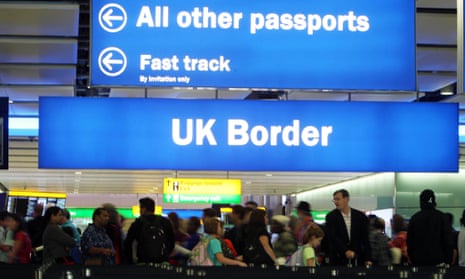Home Office officials have made more than 5,700 changes to the immigration rules since 2010, a Guardian analysis has revealed, making the visa system nearly impossible to navigate, according to senior judges and lawyers.
The rules have more than doubled in length to almost 375,000 words, resulting in a complex system which has been called “something of a disgrace” by Lord Justice Irwin and prompting a radical overhaul.
More than 1,300 changes were made in 2012 alone, coinciding with Theresa May’s introduction of the hostile environment policy when she was home secretary.
When May’s successor, Amber Rudd, resigned this year over the Windrush scandal, the new home secretary, Sajid Javid, signalled a change in tone but has yet to substantially change course on policy.
The analysis shows that at some points the Home Office introduced changes at dizzying speed, publishing new sets of changes a week apart or less on seven occasions.
One document was published in March 2014 with 22 changes, only to be superseded three days later by a second version containing another 250 changes. The overall number of changes made to the rules since 2010 spans almost 600,000 words, running to a length greater than Tolstoy’s novel War and Peace.
The immigration and asylum barrister Colin Yeo said that “the rules are so precise” it has become essential to use a lawyer, forcing applicants to pay “astronomical” legal fees. Attempts to eliminate discretion from the rules since 2012 have instead “removed any human element, humane judgments. It’s a ‘computer says no’ exercise.
“The frequency of the changes mean it’s very difficult to keep on top of them,” Yeo said. “You have to read everything that’s coming out and it’s very hard to be certain you’ve captured every single change that might be relevant to your clients. The changes are often hurried out, which means they can be badly written. They can be very difficult to understand, even for judges and lawyers. We’ve seen a number of errors in drafting that have to be corrected in later versions.”
A key change in the period analysed by the Guardian was a widespread loss of appeal rights introduced in the Immigration Act 2014, which resulted in “far less scrutiny of the Home Office”, Yeo said.
“Decision makers know nobody’s looking over their shoulder and no judge is going to review their decision. In many cases, the refusal rate has risen.”
The Guardian recently revealed that the refusal rate for migrants applying to stay in the UK after suffering domestic violence more than doubled between 2012 and 2016.
Yeo called for a “substantial rewrite” of the rules.
The Law Commission is currently simplifying the rules. The review, which began in December 2017 after Rudd referred the rules to the commission, will make recommendations to make the rules clearer for Home Office caseworkers and the judiciary.
Nicholas Paines QC, a law commissioner said: “In recent years there has been a policy of making the rules more detailed and specific.
“The intention was to produce more transparent outcomes for applicants. But inevitably, this has made the rules longer and more detailed, and the risk is that the objective of transparency is defeated.
“The Home Office want us to help put things right. We’re looking at introducing clearer, plainer language and how the rules are presented on the internet for applicants.”
Analysis shows many of the changes have focused on employment status and earnings in applications for work visas.
A Home Office spokesperson said: “The number of individual changes to immigration rules should not be used as an indicator of the number of policy changes. Many changes to the rules involve minor corrections, such as changes to individual words.
“Changes to the immigration rules are made for a variety of reasons, including to deliver critical policies that support broader government priorities including health and the economy, and to respond to the needs of those who use immigration services. They are laid in parliament and significant changes are communicated to stakeholders.”








